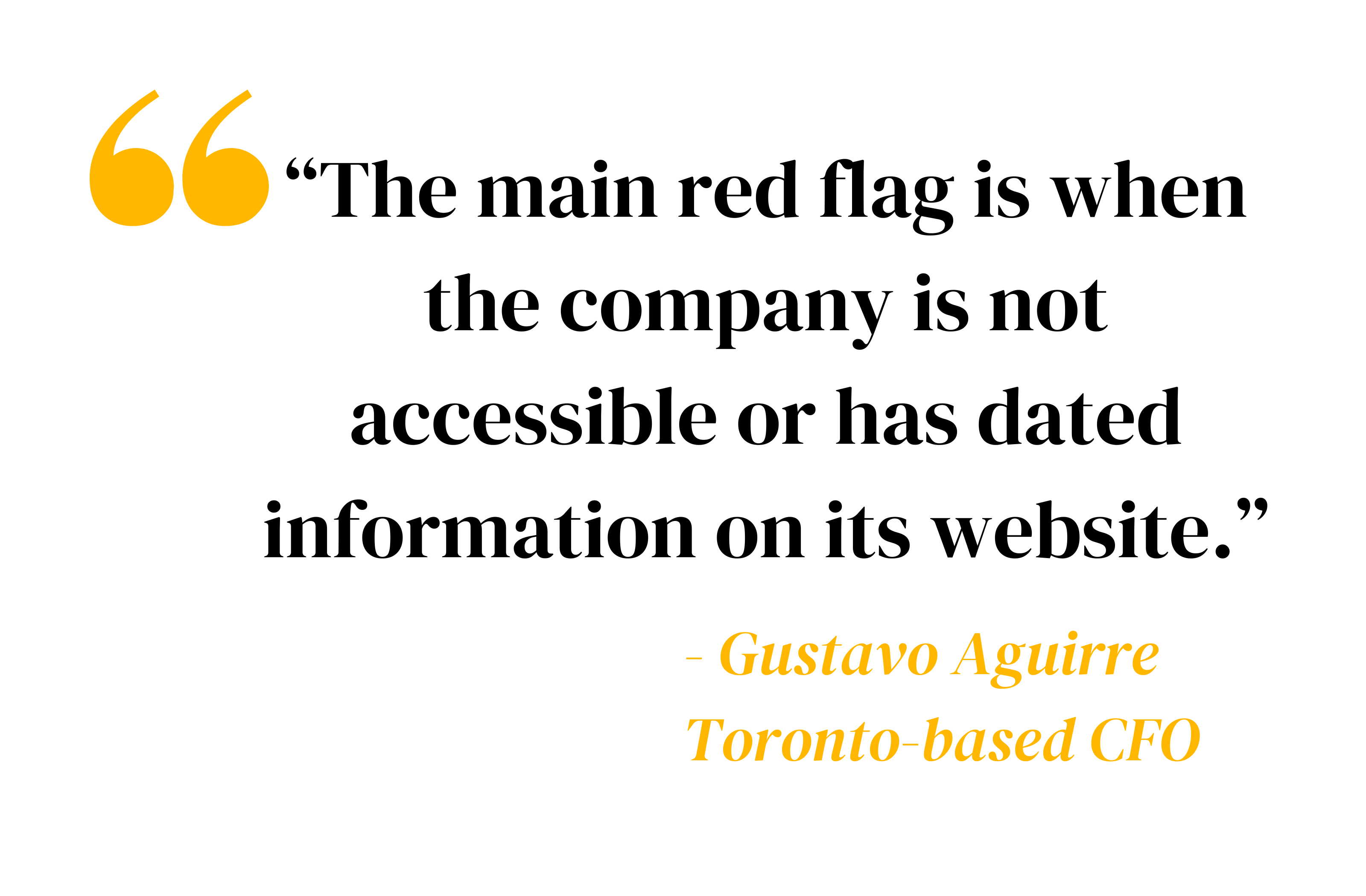
Due Diligence: Advice From 4 CFOs Before Taking a Job
Table of contents
Conducting due diligence before accepting a job offer has always been important, but during times of economic certainty, it becomes even more critical. One has only to look at the recently announced delayed start dates of recent MBA hires, or the unfolding banking crisis (starting with the implosion of Silicon Valley Bank) to realize that assessing a company’s financial stability before you sign on the dotted line is an absolute necessity.
To help guide you on what due diligence to engage in before taking a job, we asked four seasoned CFOs for their advice.
The Importance of Culture When Conducting Due Diligence
Assessing a company’s culture before you take a job is one of the most important things you can do, according to the Harvard Business Review. Shared beliefs and values mean that you will likely feel a strong alignment with a company.
Michael Mullican, Chief Financial Officer at Academy Sports + Outdoors, concurs. Most potential employees begin researching a company by conducting a Google search. This, however, will only get you so far, he says. “While Google will help an applicant find information about the company’s financial condition, litigation, or other information typically covered in the news, it will NOT tell you what the company culture is like, which is what you really need to know to decide if the company is a good fit for you,” he cautions.
He advises that applicants talk to current employees to get their candid views about whether a company is a good place to work. Media reports are another good place to start. “Any media coverage that points to a toxic work environment or poor treatment of employees is a major red flag that should give any applicant pause,” he adds.
Brian, a former CFO at a Fortune 500 company, recommends Glassdoor. “Glassdoor is….a valuable resource to get a sense of the culture not only within the company but the finance department as well,” he says. He also recommends looking at the company’s leadership team and board of directors and researching their backgrounds.

Gustavo Aguirre, a CFO based in Toronto, advises people to look into whether a company’s information is accessible or hard to find. “The main red flag is when the company is not accessible or has dated information on its website,” he says.
Michael, a CFO based in Louisiana, says “I can’t recommend strongly enough that people ask culture-related questions and follow up on answers that are suspect. I once took a job as a controller for a PE-backed service company that looked great from the outside but was not so good once you got into things. Do your outside research as well. You may also be able to use LinkedIn, FENG, or FEI to find current or former employees and ask them questions outside of normal business.”
Another good way to assess company culture and fit is by conducting social media research – look at your boss’s and co-workers’ LinkedIn profiles to get a better sense of them and their values.
And don’t neglect positive news (such as awards and community engagement), which is another important indicator of culture. Says Michael, “Good references are easier to find as companies with a good culture like to compete for local and national “best places” awards. Check to see if the company has been rated outstanding in certain areas – whether in employee engagement, community involvement, or some other factor.”
Quarterly and Annual Reports: 4 Tips On What To Look For
Those seeking employment at a publicly traded company will have access to public quarterly and annual reports, which can be a treasure trove of valuable information. But what exactly should you look for when reviewing these files? Here are four top tips from our CFOs:
1) It’s important to understand any special adjustments or one-time items that may portray an inaccurate picture of the business (good or bad),” says Mullican. He also advises “understanding the leverage profile of the business and whether it’s a business that can weather various economic cycles.”
2) “Look for oddball transactions or explanations, related party information, and especially any SEC issues or auditor disagreements/internal control weaknesses,” adds Michael. “There’s usually some employee information available, too. like stock awards, bonuses for top management, etc. Some of these can be a tell to a company where a certain subset of people are taken care of… and you may not be one of those people.”
3) “Look beyond the quarterly and annual reports for the last available earnings calls,” counsels Gustavo. “Pay attention to how management answers questions from the media.”
4) “Look at the financial history of a company. Get up to speed on the financials over the past few years and identify trends (positive and negative). Go back and read 10-K’s from the last 3 – 5 years and see how the commentary has evolved. Are there any lawsuits that have come and gone, or major initiatives they mention?” says Brian. “Go back and read earnings call transcripts to see how they are socializing earnings results and addressing questions from analysts.”
Private Companies: How to Assess Financial Stability
Assessing a privately-held company is a little trickier than assessing a public company as you won’t have quarterly and annual reports to pore through. In these situations, you should do the following:
- Assess Their Track Record. “Look for ownership that has a track record of successfully picking good management teams, investing in the business they own, and generating growth,” says Mullican.
- Ask For Financials. “Make up for the lack of financial reports by asking a lot of questions in the interview,” advises Michael. “Some companies will give you the financials if you signed, or are willing to sign, an NDA. You can also sign up with D&B or Experian to run credit reports and get that insight.”
- Consider Turnover. “Look at their turnover in key management positions and if possible contact the former employees,” urges Gustavo.
- Startup Scrutiny. “It is especially important to review the financials of a startup,” advises Brian.
Asking (The Right) Questions During Interviews
Asking questions during interviews is critical. But what specific questions and/or things should you be looking for to help you evaluate the financial position and strength of the company?
Look For Consistency: Mullican always asks “What are the three main priorities for the company this year and for the next five years?” “Consistent answers by management are an indication that the leadership is solid and has communicated clear goals to the company. Inconsistent answers, on the other hand, may be a sign that the ship is rudderless and that there may be disagreement regarding what needs to be done to move the business forward.”
Ask About Borrowing Capacity: “Ask about cash and borrowing capacity vs. planned expansion or capex spending which is an immediate sign of trouble if they have no cash or borrowing left,” suggests Michael. “Specifically for leveraged or PE-backed business, ask about the leverage and payments due to gauge where the cash is going.” He cautions that Covid has made it less useful to ask about financial results during the last few years, because “a lot of companies didn’t make much if any money, so it’s less useful than it used to be.”
Find Out What Is Going Well – and What Isn’t: Both Gustavo and Brian recommend focusing on current performance. “Ask what they consider has been the key factor in the success of the company and then focus on strategic forward-looking questions,” says Gustavo. Brian adds “Ask other leaders on the panel what they think is going well/not well financially.”Other questions you might want to ask during an interview include what the biggest challenges you might face in your position might be, or how your performance will be measured.
Due Diligence: Don’t Forget About Non-Finance-Related Issues
While assessing financial stability is priority #1 when conducting due diligence, says Michael, don’t neglect other topics that can have a big impact on whether you’ll be a good fit for the job.
Make sure, for example, to determine whether the job is remote, on-site, or a combination of both. While there are distinct advantages and disadvantages to working from home, only you know your situation and what type of work situation will suit you and your family best. Make sure you are also on the same page with your potential employer regarding how many days exactly you are expected to be in the office, and issues like paternity or maternity leave.
Along the same lines, inquire about work-life balance. Are you expected to be on-call and available for meetings after hours or on weekends? While some people are hesitant to bring this up during an interview, it’s far better to know beforehand what the expectations are so you aren’t hit with any surprises after accepting the job.As Michael puts it, “Interviewing for a new position is stressful and exciting at the same time. Don’t forget you’re interviewing them as much as they’re interviewing you. Ask hard questions and dig into the business so you know what you’ll be walking into on Day 1.”
Due Diligence Dos and Don’ts
DON’T only rely on the information you find about a company on the Internet. Negative comments could be written by a disgruntled employee or someone else with a hidden agenda.
DO read company blogs and social media to get a sense of the company and its values.
DON’T forget to get everything in writing and to ask about things like health insurance and when it starts.
DO trust your gut. Do your research on Glassdoor and other places, but if you have a good feeling about the company, the people, and the answers you’ve received to your questions, it’s important to trust your intuition. Most people can tell when they have the potential to thrive in a role.
DON’T think of due diligence as an optional process, says Gustavo. Never, ever skip it!
